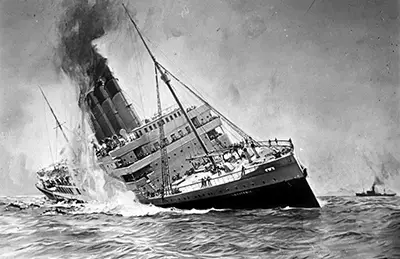Sinking of the Lusitania
RMS Lusitania Backstory

The Lusitania started out in New York being filled with the usual assortment of supplies that an ocean liner was known for. This included medical supplies, cheese, copper, machinery, meat and other miscellaneous items. It was also being secretly loaded with supplies for Britain in an ongoing war that was raging with Germany. When the ship was destroyed by Kapitänleutnant Walter Schwieger on May 7th 1915, Germany used the excuse that the ship was carrying weapons. Without having proof of this truth, it led to a very public rage over the country of Germany and its people.

Why Did Germany Fire At The Lusitania?
It was not known that the Lusitania was carrying secret supplies for Britain, and the Germans sunk it for different reasons. Submarine warfare was already in place between Britain and Germany, so it was a matter of finding a ship that looked suspicious in enemy waters.
Kapitänleutnant Walter Schwieger was already under orders to destroy ships along the northing tip of Great Britain and back east in the Irish Channel. Any ships going to and from Liverpool, England was to be destroyed as a threat and under the guidance of an ongoing war. Schweiger already had a reputation for destroying ships along his path without warning, and that was especially true for ships that he considered to be British.
Even hospital ships were not able to escape his wrath, so the Lusitania was not singled out at all. As Lusitania was a British passenger liner, it was already considered his target regardless of what it was carrying. The mistake that the Lusitania crew made was ignoring an official notice from the Imperial German Embassy that warned of an attack.
The notice made it clear that any ship on an Atlantic voyage would be entering a war zone between Britain and Germany, and any vessels not considered an ally would be destroyed. This was not an idle threat, but was treated as such, and it ultimately led to the destruction of the Lusitania.

Who Was Affected?
The fallout from the destruction of the ship affected Germany the most, as public disapproval over the disaster was explored in many media outlets. It was the cause of riots in many countries, and even in times of war stores refused to serve anyone of German descent. The public backlash was strong against Germany worldwide, even after it was proven later that the Lusitania was carrying weapons for the British.
America was already being affected before the Lusitania, as many considered Germany’s submarine warfare unrestricted. Many neutral American ships were sunk before this without warning, and almost 200 Americans died on the Lusitania.

Names to Remember
Walther Schwieger was born in 1885 and is considered the 6th most successful submarine commander of World War 1. He died in 1917 when his U-88 was destroyed by a British mine. The HMS Stonecrop can be credited with forcing his submarine in the direction of the mine.
Commander William Turner was the captain of the Lusitania, and was born in 1856. The Commander had a reputation for going out of his way to rescue people, earning him the Liverpool Shipwreck and Humane Society’s Silver Medal. During the Boer War he also received recognition for moving troops to South Africa, earning him the Transport Medal for outstanding service in 1902.
Vice Admiral Sir Charles Coke of Ireland is to thank for rescuing the surviving passengers. The distress signal that was sent from the Lusitania was received quickly enough that they could gather their men and send rescue ships out.

Important Facts
Here are some important things to remember about the sinking of the Lusitania.
- The attack happened on May 7th 1915
- Germany was embroiled in submarine warfare with the United Kingdom of Great Britain
- Commander William Turner captained the Lusitania and Walther Schwieger the U-boat U-20
- Over 1,198 were killed in the attack leaving only 761 survivors
- The Lusitania was secretly carrying supplies for war to be brought to Britain
- Lusitania has the second highest death toll of any ship, only rivalled by the Titanic

Summary
The Lusitania was indeed carrying weapons to Britain, but that wasn’t proved later until secret British documents were found to support their claim. The tragedy was a huge loss for all sides, and caused a smearing of several reputations during the war.



